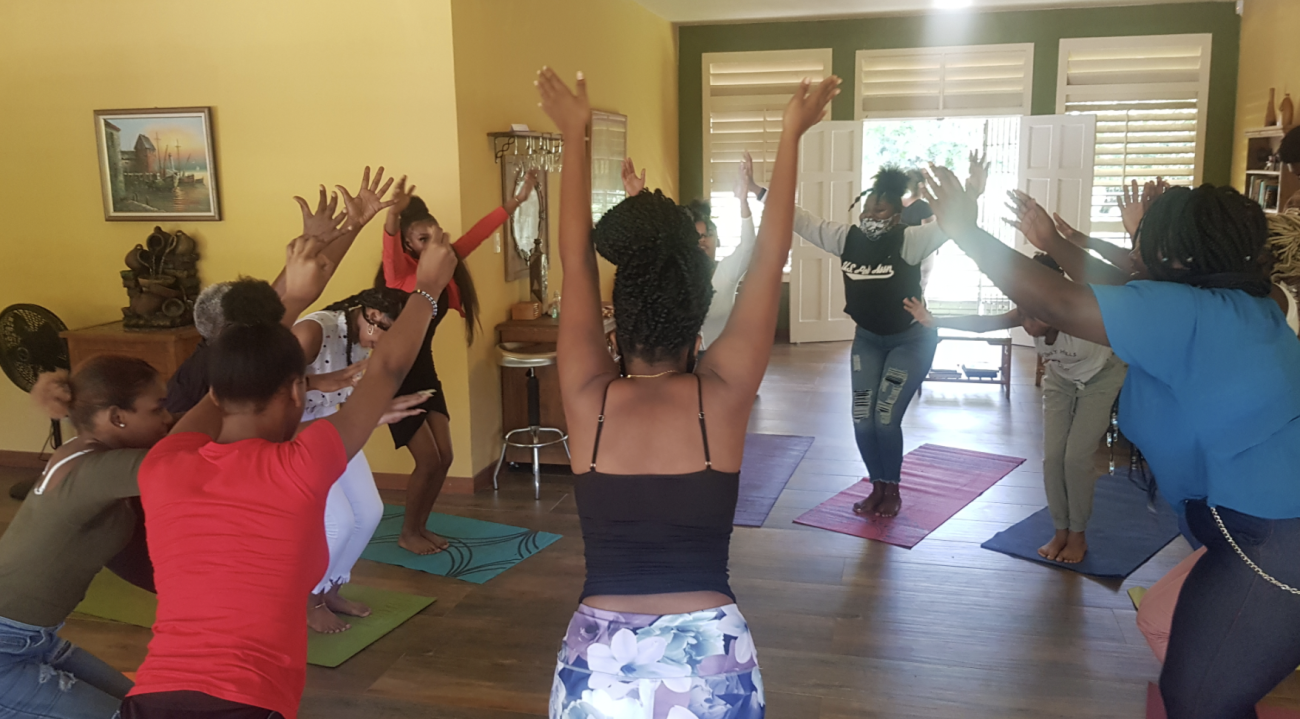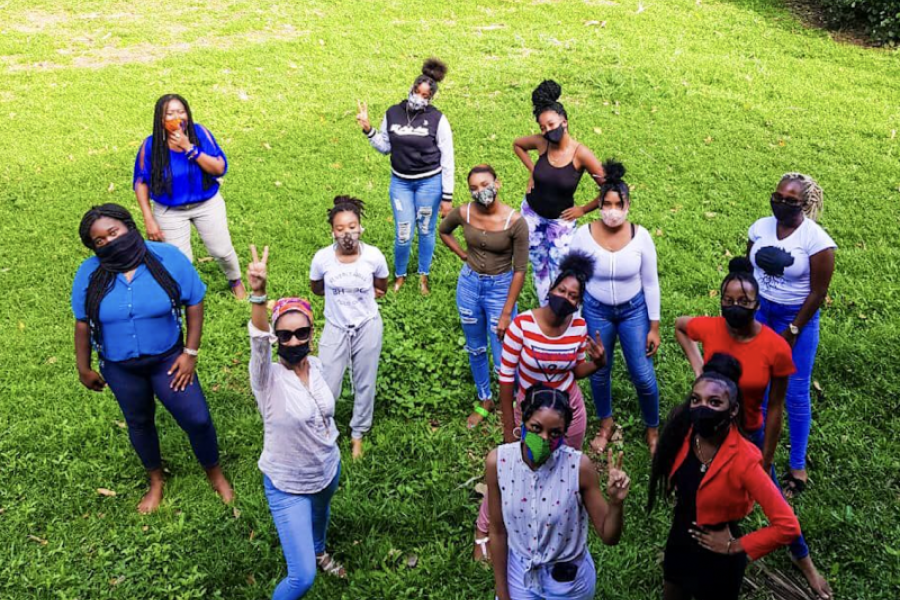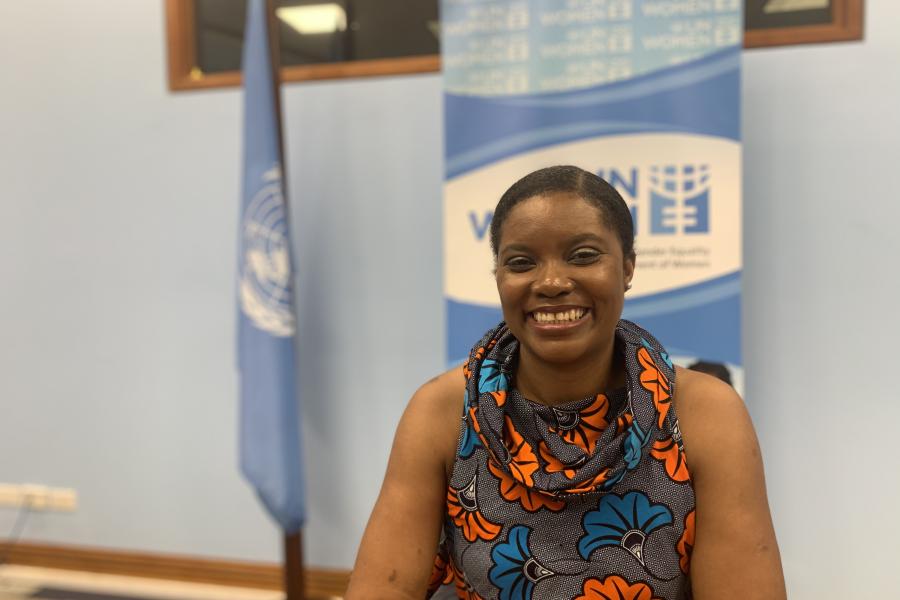Lonely island no more: In the Caribbean, helping women overcome discrimination and abuse

Across the Caribbean, young women and single mothers are getting the support they need to weather the pandemic and achieve their potential.
Here, we visit UN projects in Trinidad and Tobago and, further north, in Saint Lucia.
In Trinidad and Tobago, young women reclaim their power
St. Jude's Home for Girls has served as a refuge for girls in Trinidad and Tobago’s state care system for more than a century. Some are on remand with pending court matters, while others have dropped out of school and need counselling for trauma, depression and other conditions. Most do not have full certificates of education, placing them at a disadvantage when they must leave St Jude’s at the age of 18 — often without another place to go.

Photo: Akosua Edwards
Kylise Romain, 21, understands this predicament well. She arrived at St. Jude’s as a 13-year-old after constantly getting into fights at school. “I was teased and attacked a lot in primary school about my hair and my skin colour,” she says. “My parents did not understand what I was going through.” Ms. Romain says she responded to the bullying by becoming a bully herself.
When she left St. Jude’s at 14, she ended up in a violent relationship.
“I have seen first-hand what happens when girls leave St. Jude's without anywhere to go or anything to do. You become an easy target to be disrespected and violated just to keep a roof over your head,” she explains.
Now a third-year psychology student, she is determined to make sure other girls at St. Jude’s don’t fall into the same situation she did. She has become a mentor with the The NiNa Young Women's Leadership Programme, which helps girls from St. Jude's develop the life and entrepreneurial skills they’ll need when they leave the home. The programme is supported by UN’s Spotlight Initiative to end violence against women and girls and is run through The Cleopatra Borel Foundation, an organization that promotes empowerment through sport and education.
In December 2020, under the Spotlight Initiative, the programme started a four-part workshop called “Choices: Consequence is No Coincidence.” Topics include relationships, sex, career and the power of thought.
Ms. Romain is delighted to be part of the programme, saying, “I feel good that I can share my experiences with the girls. I appreciate it when they open up to me and tell me their stories. I am in awe of them and how they can articulate their story. That takes a lot from a teen and I attribute this ability to the NiNa programme.”
With the support of Spotlight Initiative in Trinidad and Tobago, UN Women is working with the government on the finalization and adoption of the National Strategic Action Plan on GBV and Sexual Violence, strengthening the justice/police sectors, primary prevention programming at the community level, and building the capacity of civil society. UNDP is working with the judiciary and the police to help survivors get access to services. UNICEF is helping partners develop a protocol to prevent and manage child abuse and strengthen the family court. PAHO is working to bolster health systems to optimize care and support for survivors.
In St. Lucia, single mothers find their “inner strength”
Single mothers have had a hard time of it during the pandemic. They may often face a choice between caring for their children and earning money to support them. With their children’s in-person classes cancelled, mothers face the added pressure of supervising online classes. Jobs — already hard to find — have evaporated across the economy. Now, many single mothers are worried if they can ever dig themselves out, or if the struggle will have lasting consequences for their children’s happiness.
The pressure can be intense.

Photo: Sharon Carter-Burke/UN Women
Dozens of low-skilled single mothers with infants can now breathe a little easier, as the UN and the Government of Saint Lucia have teamed up to help them weather the current crisis and get better equipped for life after COVID-19. The effort is part of a pilot project in the Eastern Caribbean, carried out by UN Women and other UN agencies in the Joint SDG Fund Programme in Universal Adaptive Social Protection.
Women participating in the project receive funds for basic needs, as well as day care, career counselling, empowerment sessions and psychosocial support.
The assistance is already bearing fruit. “I have learned to recognize my inner strength,” says one participant, Fleur (not her real name). With new skills she learned in the course, Fleur got a job after several years of unemployment. “I feel good about the new me that I will become,” she adds.
It’s not just the financial pressures of the pandemic that weigh down on single mothers, but the psychological and social ones as well. That’s especially true for women who have survived gender-based violence. For them, the counseling offered is a big help.
“This course has taught me a lot and I have been practicing it at home for myself and for my children,” says another participant, Alicia (not her real name). “It has taught me how to parent my children without shouting and hitting, how to handle difficult situations without serious conflict.”
By learning to better cope with the strain of the pandemic, these mothers and their families are less likely to be counted among the casualties of the pandemic. Such supports bolster not only individual women and their families, but whole economies, says one UN Women expert.
“A strong and gender-responsive social protection system is the bedrock of a resilient economy,” says Isiuwa Iyahen, a programme specialist at UN Women.
“When women and men are able to equitably access these services both in normal times and in times of crisis, our economies are resilient.”
A version of the story on St. Lucia was written by Julie Xavier for UN Women MCO Caribbean, and was published in the Joint SDG Fund’s website.




